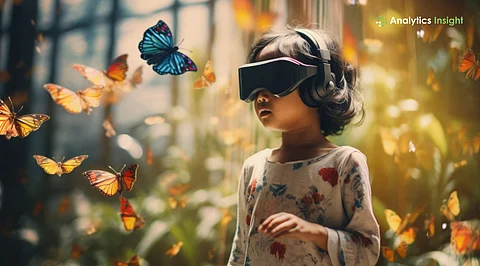Technology
Navigating the Impact of VR and AI on Children’s Empathy Development

The integration of virtual reality (VR) and artificial intelligence (AI) into children’s learning environments has raised important questions about the impact of these technologies on emotional development. As children increasingly engage with VR experiences and intelligent digital companions, concerns about the potential for emotional manipulation and the diminishing role of real-world interactions have emerged.
Technology’s Role in Emotional Development
Gen Z children are growing up in an era where VR goggles and AI systems are commonplace. These technologies provide immersive experiences that can foster empathy and understanding. For instance, VR can simulate real-life situations like conflict resolution or teamwork, giving children a chance to practice emotional responses in a controlled environment. A VR classroom might feature avatars expressing various emotions, allowing children to engage with these feelings through interaction rather than observation.
While these advancements can enhance a child’s ability to empathize, they also pose significant risks. The reliance on VR and AI may inadvertently lead to a disconnect from genuine human interactions, which are crucial for developing emotional and moral intelligence. As children navigate a world filled with digital characters and gamified learning, they might struggle to discern reality from simulation. This confusion raises questions about the authenticity of emotional responses shaped by technology.
Finding a Balance Between Technology and Real-Life Interaction
The challenge lies in ensuring that VR and AI serve as tools for growth rather than replacements for authentic experiences. Experts emphasize the importance of balancing technology with personal interactions to promote healthy emotional development. Ethical design in these systems is crucial, as is parental involvement. Parents play a vital role in guiding their children’s character development, imparting values and emotional intelligence through personal examples.
As AI systems increasingly shape educational experiences, the question arises: who influences children’s emotional development more effectively—the caregiver or the algorithm? Tailored educational materials from AI can enhance learning but may overshadow the ethical foundations that parents traditionally provide. To nurture kindness and empathy, parents must establish clear ethical limits, helping children understand the difference between what is real and what is artificial.
The potential for VR and AI to cultivate empathy in children is significant, provided these technologies are used responsibly. They can recreate a range of life experiences, allowing children to connect with others’ feelings and perspectives. Nonetheless, experts warn against overexposure to VR, which may lead to decreased empathy in real-world situations. Parents are encouraged to monitor screen time and engage in discussions about real-life experiences to ensure that technology complements rather than replaces traditional learning.
In conclusion, the evolution of VR and AI presents both opportunities and challenges for children’s emotional growth. By fostering a balanced approach that prioritizes human connection alongside technological advancements, society can help the next generation develop genuine kindness and emotional intelligence. The goal should be to integrate these tools in a way that enhances, rather than diminishes, the richness of human interaction.
-

 Technology5 months ago
Technology5 months agoDiscover the Top 10 Calorie Counting Apps of 2025
-

 Technology2 weeks ago
Technology2 weeks agoOpenAI to Implement Age Verification for ChatGPT by December 2025
-

 Health3 months ago
Health3 months agoBella Hadid Shares Health Update After Treatment for Lyme Disease
-

 Health3 months ago
Health3 months agoAnalysts Project Stronger Growth for Apple’s iPhone 17 Lineup
-

 Health3 months ago
Health3 months agoErin Bates Shares Recovery Update Following Sepsis Complications
-

 Technology5 months ago
Technology5 months agoDiscover How to Reverse Image Search Using ChatGPT Effortlessly
-

 Technology3 months ago
Technology3 months agoElectric Moto Influencer Surronster Arrested in Tijuana
-

 Technology2 months ago
Technology2 months agoDiscover 2025’s Top GPUs for Exceptional 4K Gaming Performance
-

 Technology5 months ago
Technology5 months agoMeta Initiates $60B AI Data Center Expansion, Starting in Ohio
-

 Technology5 months ago
Technology5 months agoRecovering a Suspended TikTok Account: A Step-by-Step Guide
-

 Health5 months ago
Health5 months agoTested: Rab Firewall Mountain Jacket Survives Harsh Conditions
-

 Lifestyle5 months ago
Lifestyle5 months agoBelton Family Reunites After Daughter Survives Hill Country Floods



















